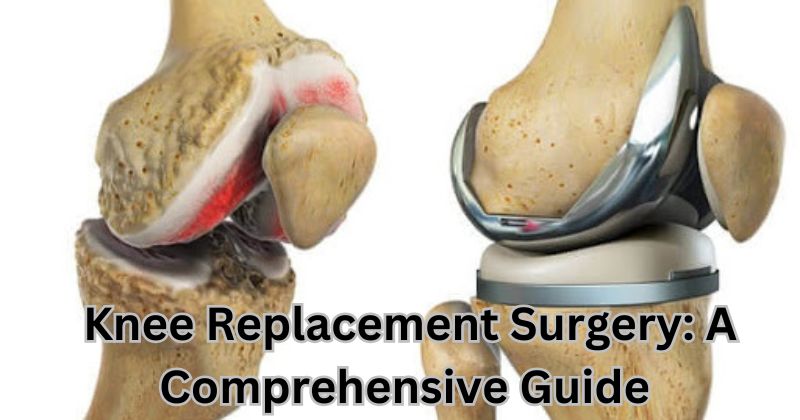Knee replacement surgery, also known as knee arthroplasty, is a medical procedure in which a damaged or diseased knee joint is replaced with an artificial one. This surgery is often recommended for patients who suffer from severe knee pain, usually caused by conditions like osteoarthritis, rheumatoid arthritis, or knee injuries. The goal of the surgery is to relieve pain, improve mobility, and enhance the overall quality of life.
In this comprehensive guide, we will walk you through what knee replacement surgery involves, the benefits, types of knee replacements, recovery expectations, and factors to consider before undergoing the procedure, along with the knee replacement surgery cost and the knee replacement surgery cost in India.
What is Knee Replacement Surgery?
Knee replacement surgery involves the removal of damaged parts of the knee joint and replacing them with prosthetic components. The knee joint is where the thigh bone (femur), shin bone (tibia), and kneecap (patella) meet. These bones are covered with cartilage that allows smooth movement. When this cartilage wears down or becomes damaged due to conditions like arthritis, it can cause chronic pain and stiffness.
There are two primary types of knee replacement surgeries:
- Total Knee Replacement (TKR): This procedure involves replacing the entire knee joint, including the femur, tibia, and patella. It is often recommended for patients with widespread knee joint damage.
- Partial Knee Replacement (PKR): In this surgery, only the damaged part of the knee is replaced. It is suitable for patients with damage confined to a specific area of the knee.
Benefits of Knee Replacement Surgery
Knee replacement surgery offers several benefits that can significantly improve your quality of life:
- Pain Relief: One of the primary benefits is the alleviation of chronic knee pain caused by arthritis or injury. After the surgery, most patients experience significant relief from pain that interferes with daily activities.
- Improved Mobility: A knee replacement can restore the ability to move the knee freely, making it easier to perform simple tasks like walking, climbing stairs, and getting up from a sitting position.
- Better Quality of Life: With reduced pain and improved mobility, patients often experience an enhanced overall quality of life. Activities such as walking, swimming, and even light jogging become more comfortable and enjoyable.
Types of Knee Replacement Surgery
- Total Knee Replacement (TKR): This is the most common type of knee replacement surgery. In a total knee replacement, the surgeon removes the damaged portions of the knee joint and replaces them with artificial components made of metal, plastic, or ceramic. This type of surgery is typically used when the knee joint has significant damage or deterioration.
- Partial Knee Replacement (PKR): For patients who have limited damage to one part of their knee joint, a partial knee replacement is considered. The surgeon removes the damaged part and replaces it with a prosthesis. This surgery is less invasive than total knee replacement and usually offers a quicker recovery.
- Minimally Invasive Knee Replacement: A less invasive approach to knee replacement surgery involves smaller incisions and advanced techniques. This type of surgery can result in less pain, a shorter hospital stay, and a quicker recovery.
Recovery Process
The recovery process for knee replacement surgery can vary depending on the type of procedure, the patient’s health, and how closely they follow their post-surgery care plan. Here is a general timeline of what to expect:
- Hospital Stay: After surgery, most patients stay in the hospital for 1 to 3 days. During this time, they will begin physical therapy to regain movement in the knee.
- Physical Therapy: Rehabilitation is crucial for recovery. Physical therapy usually starts within a day or two after surgery and continues for several weeks. It helps to improve strength, flexibility, and mobility.
- Pain Management: Pain is expected in the initial days following surgery, but it can be controlled with medication prescribed by the doctor. Most patients report a significant reduction in pain after the first few weeks.
- Return to Normal Activities: Most patients can return to light activities within 6 weeks, and more strenuous activities within 3 to 6 months. However, high-impact activities like running or jumping should be avoided for the long term.
Factors to Consider Before Undergoing Knee Replacement Surgery
Before opting for knee replacement surgery, it is important to consider the following:
- Age and Health Condition: The ideal candidate for knee replacement surgery is typically between 60 to 80 years old, although patients of other ages may also benefit from the procedure. The patient’s overall health, medical history, and lifestyle will affect the outcome of the surgery.
- Other Treatment Options: Surgery is often considered after non-surgical treatments, such as physical therapy, medications, and injections, have not provided sufficient relief.
- Post-Surgery Care: Committing to post-surgery rehabilitation and following the doctor’s recommendations for rest, movement, and exercises will greatly affect the outcome of the surgery.
- Surgical Risks: Like any surgery, knee replacement comes with risks, including infection, blood clots, and prosthesis failure. It’s essential to discuss potential risks with the surgeon beforehand.
Knee Replacement Surgery Cost
The knee replacement surgery cost can vary widely depending on various factors, including the country, hospital, type of surgery, and healthcare provider. In general, the total cost includes pre-surgical consultations, the surgery itself, anesthesia, hospital stay, post-surgical rehabilitation, and any follow-up treatments.
In countries like the United States or the UK, the cost of knee replacement surgery can range from $30,000 to $50,000 or more. The cost can increase if additional treatments, such as physical therapy, are required.
Knee Replacement Surgery Cost in India
When considering the knee replacement surgery cost in India, the figures are notably more affordable compared to Western countries. India has become a popular destination for medical tourism due to the availability of high-quality healthcare at a fraction of the cost. The knee replacement surgery cost in India typically ranges from ₹2,00,000 to ₹4,50,000, depending on the hospital, type of procedure, and surgeon’s expertise.
India’s reputation for advanced medical facilities, skilled orthopedic surgeons, and affordable pricing make it an attractive option for patients seeking knee replacement surgery.
Conclusion
Knee replacement surgery is a life-changing procedure for individuals suffering from knee pain and disability. It can provide significant relief, improved mobility, and a better quality of life. However, it is essential to weigh the benefits and potential risks before deciding to undergo the procedure. The knee replacement surgery cost and the knee replacement surgery cost in India are important considerations, but with proper planning, you can make an informed decision about your treatment options. Always consult with a qualified orthopedic surgeon to determine the best approach for your condition.
for more(click here)


